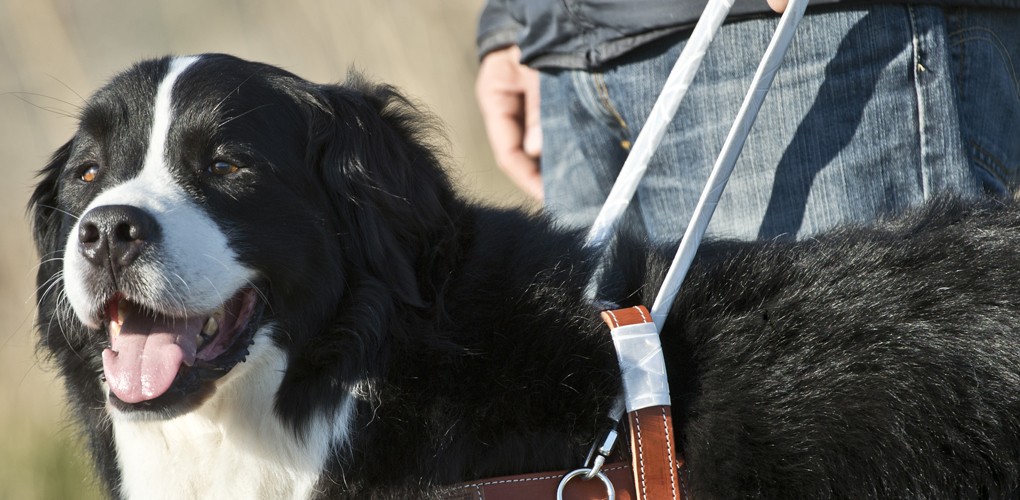Using animals to palliate a disability

Many people with disabilities use an animal for physical or emotional support.
Animals are one of many ways to palliate a disability. Service dogs, including guide dogs have been recognized as a means of palliating a disability by the Québec courts, but other animals could eventually be recognized as well.
| Under the Charter of Human Rights and Freedoms, you cannot discriminate against a person because of their disability or because of the way they choose to palliate it. Discrimination can result, for example, from refusing to admit a person accompanied by their animal into a public place or accommodation, or from not offering this person the same services, comfort and respect that are usually offered there.
|
-

Trained service dogs
Anyone who uses a trained service or a trained guide dog to palliate their disability has the right to receive reasonable accommodation so that:
- They can access, without discrimination:
- public places, like shops, restaurants, hotels and other tourist accommodations
- public transportation and taxis
- workplaces
- recreational places, like campsites and movie theatres
- housing
- They can obtain goods or services that are ordinarily offered to the public at these places, without discrimination and at no additional cost.
When a person brings their service dog into areas that are open to the public:
- The dog must wear a visual marker that it is a service animal bearing the logo of the organization that trained it (e.g., a harness, bandana, vest, etc.)
- The person may be required to present a proof of the dog’s special training or certification (e.g., a card or letter from the organization confirming that the dog is a service animal or has completed special training).
The person does NOT have to provide documentation or proof of their disability, medical need or health condition, nor to provide the opinion of a health professional.
Establishments do not have a duty to accommodate service dogs if doing so would result in undue hardship. In this case, they must still document the person’s needs and collaborate with them to find alternative solutions.
What is undue hardship?
The concept of undue hardship is used to assess whether accommodation is reasonable in a given situation. Undue hardship may exist if the accommodation:
- would be prohibitively expensive
- would impact the business’ ability to operate
- would significantly affect other people’s rights or safety
Example of undue hardship
Service dog access to all parts of a hospital
Sometimes, hospitals can restrict access for reasons of hygiene. A service dog may be refused entry to areas like the operating room, where maximum sanitation is critical.Example that is not undue hardship
Allergy to dogs
Dog allergies are not an undue hardship that allow establishments to refuse access to a service dog. In 2008, the Superior Court of Québec ruled that dog allergies are less harmful than food allergies, and are not grounds for undue hardship. The Court ruled that dogs pose no serious threat to an allergic person’s health unless they have close contact.However, if you are asked to accommodate a service dog, and someone in your establishment is allergic to dogs, you must find ways to accommodate both the allergic person and the person who uses the service dog.
- They can access, without discrimination:
-

Service dogs in training
The dog in training may be a dog actually in training or in foster care with a view to its future training.
Access to public places and transport, to work or leisure areas and to the home of the person in charge of training the dog could be conditional on an assessment of the situation.
That said, because people with a disability will benefit from the training, you are encouraged to allow these dogs in public places.
-

Therapy animals without training
Therapy animals without special training could be, for example, a dog self-trained by the person using it, or an emotional support or zootherapy animal.
A person with a disability who uses such an animal may have to demonstrate their needs and the benefits of the animal to meet them, in order to gain access to public places and transport, as well as work, leisure or housing.
Since it is up to each person with a disability to decide how they will palliate it, some may ask an establishment to provide reasonable accommodation for their therapy animal.
The person responsible for processing such a request will have to make a serious and genuine effort, and will have to carry out a contextual analysis of the request, i.e. on a case-by-case basis. They may require information about:
- the person’s need for the animal (disability, medical condition, mental health condition)
- the animal’s usefulness in meeting this need
The analysis of the accommodation request may vary depending on :
- the location
- the context, and
- the duration of the animal's presence.
Indeed, the use of an emotional support animal in one's home is distinct from the use of an animal on public transport, in a teaching environment or in the workplace. In these cases, safety issues may be more pressing.
A reasonable accommodation agreement with terms and conditions specific to the context could then be concluded between the person receiving the request and the person using the animal. This agreement could cover the duration of the animal's presence, permitted and prohibited areas, the improvement of the animal's environment, and the use of the animal.
For more information on animal-related undue hardship, see the information box above, in the “Service and guide dogs” section of this page.
Certification and formal training
In Québec, there is no official certification issued by a government agency attesting to the training of service or guide dogs or any other animal used to palliate a disability. To learn more about the training an animal has received, you can contact the training provider.
The Commission does not keep a record of the organizations that provide training for guide or service dogs in Québec, nor provide training certificates for any kind of service animal.
The information on this page is also available in this document (Word) that you can download and print (French only).
Learn more
- FAQ | Dogs and other animals to palliate a disability
- The Commission’s position on service dogs
- Search for Judgments of the Québec Human Rights Tribunal regarding guide dogs and other service dogs
- Online Guide to Processing an Accommodation Request (French only)
- Disability as a prohibited ground for discrimination
Discriminated against because of her guide dog
Discriminated against by a gym owner because of the presence of her guide dog, Gracia went all the way to the Human Rights Tribunal to have her rights recognized.
